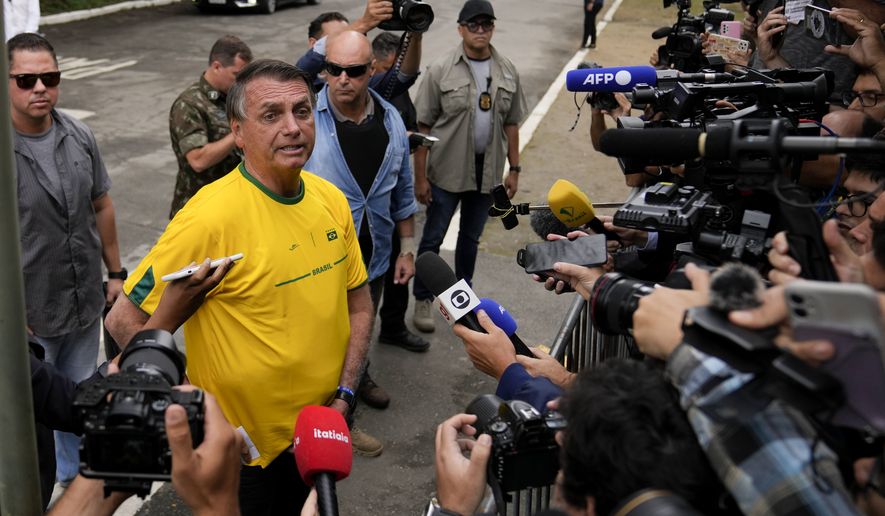The top two candidates in Brazil’s presidential election, leftist former President Luiz Inacio Lula da Silva and right-wing incumbent Jair Bolsonaro, are headed for a runoff after neither won Sunday’s crowded contest outright.
The runoff will pit Mr. Bolsonaro, a regulation-slashing firebrand who has been called Brazil’s version of Donald Trump, against his political nemesis, Mr. da Silva, head of the Workers’ Party.
Nine other candidates were in the race, but their support paled compared with Mr. Bolsonaro and Mr. da Silva.
With 98.8% of votes counted, Mr. da Silva had 48.1%, ahead of Mr. Bolsonaro with 43.5%, according to the electoral authority.
In Brazil, the winning candidate must take more than 50% of the vote or the two front-runners will face off in a second round of voting.
Polling data on Saturday from the Brazilian firm Datafolha showed a commanding lead for Mr. da Silva. The pollsters said 50% of the respondents said they would vote for the former president, compared with 36% who were inclined to return Mr. Bolsonaro to power.
The election is widely considered the most important in years. It is a crucial moment for Brazil, which has been racked by rising fuel prices and an economic slowdown.
Some analysts predicted that Mr. da Silva would be unable to hit the 50% mark required to avoid an Oct. 30 runoff with Mr. Bolsonaro.
“I think what’s more likely is that there will be a second round,” Brazilian political columnist Jose Roberto de Toledo told The Guardian. “If there is a second round, it will be much worse than it has been thus far. It would mean four weeks of gore. I hope I’m wrong.”
Mr. Bolsonaro promised Brazilians that he would create jobs by slashing red tape, cutting taxes and investing in technology. He has faced withering criticism over his administration’s response to the COVID-19 pandemic in Brazil and for extensive erosion of the Amazon rainforest.
If returned to office, Mr. Bolsonaro said, he will continue privatizing public companies and increasing mining opportunities. He has stated that Brazil, like any other country, has the right to use its natural resources. He also promised to continue sending $110 monthly checks to Brazilians for pandemic aid.
Mr. da Silva, a former union leader, was Brazil’s president from 2003 to 2010. It was a time of relative economic prosperity. He was jailed as part of a wide-ranging corruption investigation, but the dismissal of his conviction allowed him to make another bid for elective office.
Mr. da Silva promised to raise taxes on the wealthy, enact generous social programs and bring back environmental regulations that Mr. Bolsonaro’s administration has relaxed.
Mr. Bolsonaro has portrayed himself as a defender of traditional family values and personal liberties and a foe of political correctness and other liberal policies. Manuel Pintoadinho, a metalworker living in Rio de Janeiro, told NPR that he intended to cast his ballot for Mr. Bolsonaro even though the economy has been rough.
“The pandemic ruined everything. Inflation is really high,” Mr. Pintoadinho said. “It’s not his fault.”
Holding an election on a single day for 150 million people across a country the size of a continent is not a simple task, said Oliver Stuenkel, a professor in the school of international relations at Brazil’s Fundacao Getulio Vargas in Sao Paulo.
“It is a tremendous logistical challenge, and pulling it all off so seamlessly should be a source of national pride,” Mr. Stuenkel said in a message on Twitter.
He rejected Mr. Bolsonaro’s doubts about the fairness of the election. He said recent comments could cause millions of citizens to question the results and deny the legitimacy of the next government.
“The quality of a country’s democracy not only depends on its government. It also depends on the opposition,” Mr. Stuenkel said. “A democratic opposition provides constructive criticism and holds the government accountable. It should not, however, question the legitimacy of the government.”
• Mike Glenn can be reached at mglenn@washingtontimes.com.




Please read our comment policy before commenting.